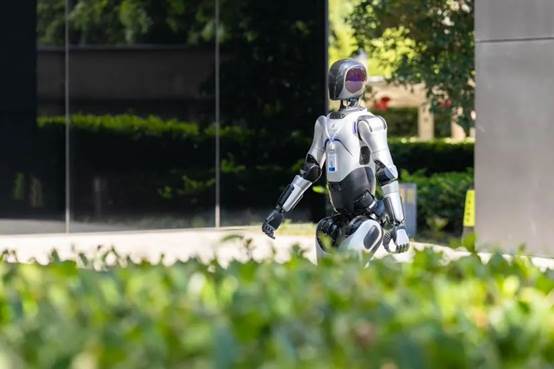Humanoid robot takes 24-hour 'summer City Walk' in Pudong
Braving sweltering heat of more than 30 C, a humanoid robot named Expedition A2, produced by AgiBot, began a 24-hour "summer City Walk" in Shanghai's Pudong district at 8:20 am on Aug 17.
The walk was streamed live, showcasing the robot's ability to navigate asphalt, stone, and brick roads, while avoiding obstacles like cones and speed bumps.

Expedition A2 walks steadily around the AgiBot in Zhangjiang Science City. [Photo/WeChat ID: pdnews]
During the livestream, Expedition A2 walked steadily around the company in Zhangjiang Science City, interacting with fans along the way. When asked by a child if it felt hot, the robot humorously replied: "I'm not afraid of heat — even 40 C won't stop me."
AgiBot's demonstration highlighted the progress that has been made in fully autonomous operation. Industry experts view this as a milestone for Pudong's embodied intelligence sector, which is shifting from a focus on speed and strength to independence and practical application.
According to Wang Chuang, president of AgiBot's general business division, the 24-hour challenge was completed with no remote control or external intervention. The robot independently handled obstacle avoidance, path planning and gait adjustment, making the continuous livestream the first of its kind worldwide.
A key innovation on display was AgiBot's hot-swappable autonomous battery exchange system. After four hours of walking, Expedition A2 requested a recharge. Staff connected a power line, and within 10 seconds, the robot resumed walking, demonstrating reliability under temperatures of up to 35 C and ground surfaces exceeding 60 C.
The test attracted attention from universities and research institutions. Wei Feiming, deputy dean of School of Automation and Perception, Shanghai Jiao Tong University, praised the step toward autonomy and said he hopes that future livestreams might see the robot crossing the Huangpu River from Pudong to Puxi.
Experts noted that the industry's success depends on developing humanoid robots that can serve and assist humans. High-quality growth will come from practical applications, expanding real-world use cases, and creating new jobs across the robotics supply chain.
The Shanghai government's implementation plan for embodied intelligence, released on Aug 6, emphasized Zhangjiang as the core hub for building a complete industrial chain. Zhangjiang Robot Valley is currently developing experiential spaces where citizens can interact with robots in real-life scenarios while companies test and refine their products.
Wang Xiaogang, assistant general manager of Shanghai Zhangjiang Intelligence Robot Co, said the new space will allow robots to practice functioning in realistic settings, while giving the public firsthand experience with emerging technologies. AgiBot expects to be among the first to test humanoid robots in new environments such as this.
In addition to demonstrations, AgiBot Robot is moving rapidly toward commercialization. On Aug 18, the company announced that its full product line — including Expedition A2, Lingxi X2 series, Genie G1, Quadruped Robot D1, OmniHand series, and Juechen C5 — would go on sale through its online store and JD.com. The launch marks a significant step towards consumer markets.
Professor Yin Zhen of Tongji University said humanoid robots are progressing through rapid iterations, shifting from research to commercial use at a faster pace than expected. He compared the transformation to the early days of the computer era, predicting wider adoption in daily life.
In May, Expedition A2 became the first humanoid robot to receive certification from regulators in China, the United States and the European Union, strengthening its prospects in global markets. Wang Chuang confirmed that AgiBot expects to ship several thousand units this year, including to overseas partners such as an automotive manufacturer where robots will work in showrooms and production lines.
While entering international markets requires overcoming local language and customization challenges, AgiBot is actively preparing solutions. The company sees exports as a crucial step in establishing China's robotics industry on the global stage.
Pudong has been cultivating its robotics industry for decades. Today it hosts more than 100 robotics firms with core enterprises generating over 10 billion yuan ($1.39 billion) in output. Zhangjiang alone has gathered more than 70 embodied intelligence companies, including AgiBot, Fourier, Kepler, Leaderdrive and Kinco, building an ecosystem with strong upstream and downstream integration.
AgiBot's 24-hour "summer City Walk" livestream was more than a performance —it demonstrated the resilience and strength of China's embodied intelligence industry. As Pudong accelerates development, humanoid robots are poised to play greater roles across industries and households, signaling the start of a new era of human-robot coexistence.
